Appendix 1: 0-Level Characters
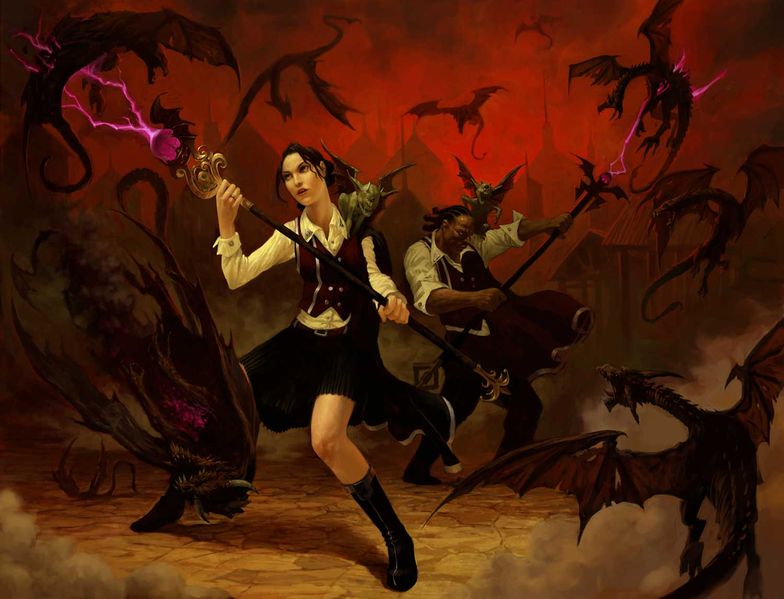
Appendix 1: 0-Level Characters

| The Fledgling Character | Raising Ability Scores | Alignment | Specialized Abilities | Luck |
| Locating Instructors | - | - | - | - |
| Class Skills and Proficiencies | Clerical Skills | Druidic Skills | Fighting Skills | Magical Skills |
| Thieving Skills | Monk Skills | - | - | - |
| Proficiencies | - | - | - | - |
| Languages | - | - | - | - |
| Combat and Wounds | - | - | - | - |
| Equipment and Money | - | - | - | - |
| Using Magical Equipment | - | - | - | - |
| Joining a Character Class | - | - | - | - |
| Skills From Other Character Classes | Cleric and Druid Skills | Fighter Skills | Magic-User Skills | Thieves |
| Monks | - | - | - | - |
| NPCs | - | - | - | - |
| Oriental Characters | - | - | - | - |
| Acting as DM for Zero-Level Characters | - | - | - | - |
Morality Chart
| Alignment Tendency | Evil | Neutral | Good |
| Score | 5 or less | 6-14 | 15 and above |
Ethics Chart
| Alignment Tendency | Chaotic | Neutral | Lawful |
| Score | 5 or less | 6-14 | 15 and above |
Study Time Table
| Type of Skill | Study <(Instruction)> Points for Success |
| CAVALIER | 6 (guess) |
| Paladin | 8 |
| CLERIC | 4 |
| Druid | 6 |
| FIGHTER | 2 |
| Barbarian | 4 (guess) |
| Ranger | 7 |
| MAGIC-USER | 6 |
| Illusionist | 6 |
| THIEF | 3 |
| Assassin | 6 (guess) |
| MONK | 10 |
| BARD | 10 (guess) |
Luck Roll
| 01-10 | Terible Failure |
| 11-55 | Failure |
| 56-80 | Partial Success |
| 81-87 | Learning |
| 88-95 | Insight |
| 96-100 | Great Insight |
0-level characters can attempt the abilities of other classes during the game
Learning Roll
| 01-10 | Terrible Failure |
| 11-49 | Failure |
| 50-75 | Partial Success |
| 76-85 | Learning |
| 86-97 | Insight |
| 98-100 | Great Insight |
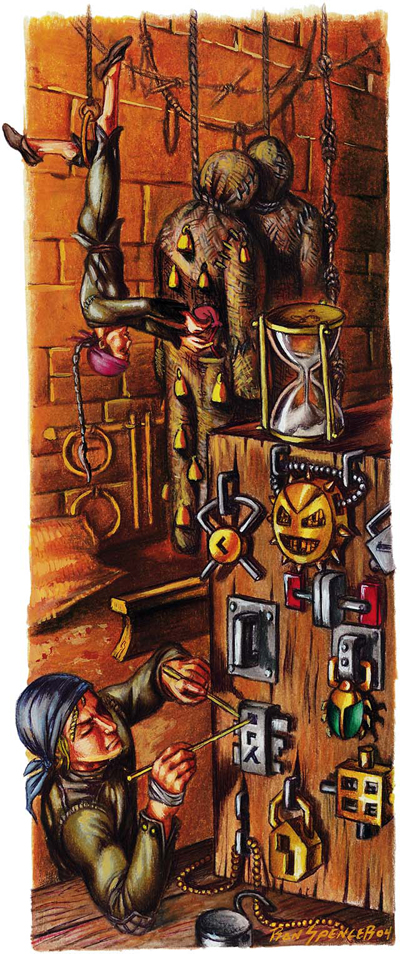
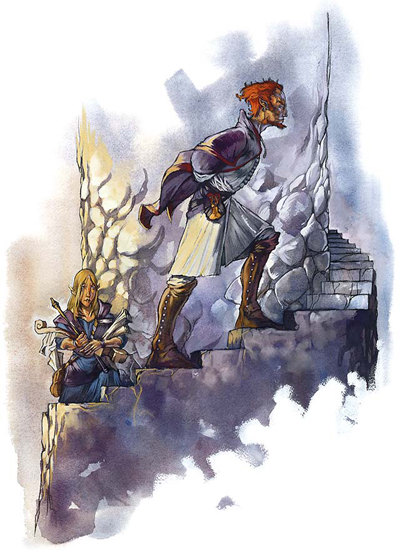
For those not familiar with it, I think this is how it works (perhaps I should field a query over at Jim's Q&A thread):
Table of Contents
1. Start
2. AP (Attribute Points)
3. Class Skills
3a. Study
3b. Luck
3c. Class Skills: Attempt Tables
4. Alignment
5. Instructors
6. Proficiencies
7. Languages
1. START
1. Choose race
2. Roll age (use lowest category, though this is not specified)
3. Roll height & weight (DMG.12)
3. Roll social class (UA.82)
4. Roll birth rank (UA.83)
(Note: For characters from the Free City of Greyhawk, 3&4 can be
replaced with the tables on page 12 of Gem of the Flanaess).
5. Roll secondary skill (DMG.12)
6. Roll for Aptitude Points (GHA.117) : 90 + 1d20
7. All abilities start out at 3.
8. Comeliness (UA.6) starts out at 3d6 (guess), but may be raised.
8. HP start out at 3.
9. Raise abilities to racial minimums (spend AP to do this).
10. Choose Ethics & Morality scores (equiv. to alignment, on a
scale of basically 0-20, with 10 being neutral) : default = E10 M10
2. AP (ATTRIBUE POINTS)
* 1/week you may assign 1 to 8 AP to a single ability score or HP
* HP can be raised to 18 through AP
3. CLASS SKILLS
* 0-level characters may STUDY class-based skills of up to 12th level
(learning)
* 0-level characters may attempt class class-based skills of up to
12th level (luck)
3a. STUDY
* you must study at least 1 hour per day
* you gain 1 IP per week of study (Instruction Point)
* every 6 IP uses up 1 AP
INSTRUCTION TIME
TYPE OF SKILL = INSTRUCTION POINTS FOR SUCCESS
Cavalier = 6 (guess)
Paladin = 8
Cleric = 4
Druid = 6
Fighter = 2
Barbarian = 4 (guess)
Ranger = 7
Magic-User = 6
Illusionist = 6
Thief = 3
Assassin = 6 (guess)
Monk = 10
Bard = 10 (guess)
3b. LUCK
* 1/day per class skill, you may ATTEMPT to use that skill with luck
* you gain IP on a successful ATTEMPT (when you rely on luck): 3, 6,
9, or 12
* you may ATTEMPT a class skill that you have IP in (no limit in times
per day)
* earning 1 IP takes 1 week
* studies for a class skill must be consecutive (ie. 2 consecutive
weeks for a fighter ability).
* if not consecutive, then the lessons for a class skill are remembered
for 3 x IP in months (ie. a character who has earned 6 IP towards a monk
skill keeps those points for 18 months)
3c. CLASS SKILLS: ATTEMPT TABLES
ATTEMPT (trusting to LUCK)
01-10 = Terrible Failure
11-55 = Failure
56-80 = Partial Success, 2 PIP
81-87 = Learning, 3 PIP
88-95 = Insight, 4 PIP
96-100 = Great Insight, 6 PIP
* when making an ATTEMPT through luck, note any 'PIP' gains. these are Potential IP (PIP), not actual IP. they turn into actual IP if that class skill is studied. remember that every 6 IP uses up 1 AP.
* Luck rolls: for cleric skills, alignment must match that of the deity
that they are appealing to.
* Luck rolls: to turn undead, a holy symbol is needed
* Luck rolls: for MU spells, a spellbook is needed
* Luck rolls: for thief skills, a thieves' kit is needed
ATTEMPT (using IP)
01-10 = Terrible Failure
11-49 = Failure
50-75 = Partial Success, 3 IP
76-85 = Learning, 6 IP
86-97 = Insight, 9 IP
98-100 = Great Insight, 12 IP
* a character may use IP to attempt a class skill. (IP do not get used up: the numbers there are minimums). if has enough IP for the result, it happens.
* Partial Success = the character may perform this ability as a 1st
level character
* Partial Success = if the character gains this
result through luck, they earn 2 IP on their first week of study for this
class skill (PIP=2)
* Learning = the character may perform this ability as a 1st level
character
* Learning = if the character gains this result
through luck, they earn 3 IP on their first week of study for this class
skill (PIP=3)
* Insight = the character may perform this ability as a 12th level
character.
* Insight = if a WP (weapon proficiency), the character
attacks as a 12th level character.
* Insight = NWPs (non-weapon proficiencies) can
be performed with a -4 bonus to the roll.
* Insight = after 1 hour per point of intelligence,
the character forgets the special insight.
* Learning = if the character gains this result
through luck, they earn 4 IP on their first week of study for this class
skill (PIP=4)
* Great Insight = the character gains all of the advantages of Insight,
above, and retains them for 1 week per point of intelligence
* Great Insight = if this ability was gained through
luck, the ability is retained for 2 weeks (4 weeks for MU spells).
4. ALIGNMENT
ETHICS
5 or less = chaotic
6-14 = neutral
15+ = lawful
MORALITY
5 or less = evil
6-14 = neutral
15+ = good
5. INSTRUCTORS
* Sages have the same % chance to be able to teach a skill as the %
chance to provide Exact information in the relevant Special Category (add
Weapons & Warfare and Crime & Criminals)
* Colleges might charge as much as 500 gp per year in tuition
* Note that colleges exist in The City of Greyhawk, as well as the
huge pyramid that is The Greyhawk University of Magic Arts (CoG.G.GotF.5)
6. PROFICIENCIES
* The cost of learning 1 proficiency is 1 AP per proficiency and it
takes 2 weeks of instruction to pick up.
* The non-proficiency penalty for a 0-level character is -3.
* No character may ever specialize in more than 2 weapons.
7. LANGUAGES
* Every character begins knowing 1 language, the local Common tongue.
* New languages may be studied as 1-slot proficiencies (study time
= 1 week if the character is surrounded by native speakers).
* Characters cannot rely on Luck to use a language until they have
heard it spoken for 1 hour.
* Insight lets a character pretend to be a native by making
a successful Intelligence check on a 1d20.
5. CLASS INFO
CAVALIER SKILLS (6 IP each, unless noted) (guess)
AP = 72 (before HP)
3/2
s15, i10, w10, d15, c15, ch6 = 53 AP
* exceptional strength = 2
* +3/+4 bonus for exceptional strength = 2
* multiple attacks against 0 level opponents = 2
* weapon of choice = 6
* damage bonus with lance = 6
* parrying = 6
* mounted combat attack bonus = 6
* stable seat (unlikely to be thrown from the saddle) = 6
* appraise horses = 6
* improve strength = 6
* improve dexterity = 6
* improve constitution = 6
* immune to fear = 6
* protection from fear aura = 6
* 90% immunity to mind-affecting spells or powers = 6
* +2 saves vs. illusion spells = 6
* function at -HP = 6
= 84 weeks (14 AP)
3*+ horsemanship abilities
PALADIN SKILLS (8 IP each, unless noted)
AP = 95 (before HP)
3/2
s15, i10, w13, d15, c15, ch17,
* exceptional strength = 2
* +3/+4 bonus for exceptional strength = 2
* multiple attacks against 0 level opponents = 2
* detect evil = 8
* +2 saving throws = 8
* immune to disease = 8
* lay on hands = 8
* cure disease = 8
* protection from evil = 8
= 54 weeks (9 AP)
* weapon of choice = 6
* damage bonus with lance = 6
* parrying = 6
* mounted combat attack bonus = 6
* stable seat (unlikely to be thrown from the saddle) = 6
* appraise horses = 6
* improve strength = 6
* improve dexterity = 6
* improve constitution = 6
* immune to fear = 6
* protection from fear aura = 6
* 90% immunity to mind-affecting spells or powers = 6
* +2 saves vs. illusion spells = 6
* function at -HP = 6
= 132 weeks (14 AP)
* use holy sword
3* turn undead
9* cast spells
* whenever paladin abilities are used, add 1 point to E & M
CLERIC SKILLS (4 IP each = 8 weeks) (req: alignment
tendencies must match that of deity)
AP = 8
* turn undead
* cast spells
* using a cleric skill modifies both E&M 1 point towards a deity's
alignment
* 0 level clerics can cast 1 cleric spell per day, or 2 if they have
a Wisdom of 14+
* "Great Insight" allows a character to cast any 1 spell as a 12th
level character : this spell may be as high as 6th level in power
* Casting a spell more than once costs 1 AP
* Each time a spell is cast, roll 1d20 : if the result is above Wis,
the spell fails, and a small boil appears on the character's forehead,
reducing Comeliness by 1 point for the rest of the day
* Characters automatically fail this check if they have broken clerical
codes in the last 24 h.
* A minimum Wis of 9 is needed to learn & cast clerical spells
DRUID SKILLS (6 IP each, unless noted)
AP = 18
* cast spells
* Druidic (1 IP, as language)
+2 saves vs. fire & lightning
3* identify plants
3* identify animals
3* identify pure water
3* 'pass without trace'
7* immunity to woodland charm
7* shapechanging
3*+ additional language
* 0 level dcharacters can cast 1 druid spell per day, or 2 if they have
a Wisdom of 14+ : the other details of spellcasting are generally as for
clerics, above
* The required Wisdom check to cast a spell automatically fails if
they have worn metal armor or used forbidden weapons in the last 24 hours
* Casting a spell more than once costs 1 AP
FIGHTER SKILLS (2 IP each)
AP = 8
* exceptional strength: 2 IP
* +3/+4 bonus for exceptional strength: 2 IP
* fight at a given ability level: 2 IP
* multiple attacks against 0 level opponents = 2
* weapon proficiencies
* weapon specialization
* a warrior cannot gain exceptional strength until he attains 18 Strength
* a result of "Great Insight" on the Learning Table automatically results
in a Strength of 18/00
BARBARIAN SKILLS (6 IP each, unless noted) (guess)
AP = 55
s15, i6, w6, d14, c15, ch6 = 44
* exceptional strength = 2
* +3/+4 bonus for exceptional strength = 2
* multiple attacks against 0 level opponents = 2
* AC bonus = 6
* Con bonus = 6
* saving throw bonuses = 6
* climb cliffs & trees = 3
* hide in natural surroundings = 3
* surprise others = 6
* less chance to be surprised = 6
* back protection = 6
* leaping & springing = 6
* detect illusion = 6
* detect magic = 6
* leadership = 6
* survival (1 AP, 1 week)
* first aid (1 AP, 1 week)
* tracking (1 AP, 1 week)
* outdoor craft = 6
= 79 weeks, 11 AP
(*) animal handling
(*) horsemanship
(*) long distance signaling
(*) running
(*) small craft, paddled
(*) small craft, rowed
(*) sound imitation
(*) snare building
4* strike creatures immune to normal weapons
* note that barbarians do not need to train as other characters do
RANGER SKILLS (7 IP each, unless noted)
* exceptional strength = 2
* +3/+4 bonus for exceptional strength = 2
* multiple attacks against 0 level opponents = 2
* damage bonus to giant-types = 7
* surprise others = 7
* less chance to be surprised = 7
* tracking = 1 AP (1 week)
= 27 IP, 28 weeks
8* druidic spells
9* MU spells
MAGIC-USER SKILLS (6 IP each) (req: intelligence of at least 9 to learn magic-user spells)

* cast spells
= 6
* 0-level magic-users can memorize no more than 1 1st level or 4 0-level
spells per day
* "Insight" allows a MU to cast 1 spell as if he was 12th level (this
includes spells up to the 6th level)
* It costs 1 AP per spell learned and used more than once
* whenever a novice tries to cast a spell other than a cantrip, roll
a 1d20 Intelligence check
* if armor has been worn in the last 24 h, then apply a +3 penalty
to this check
* roll on the Learning Table when memorizing ; roll a 1d20 Intelligence
check while casting (if the Intelligence check fails, then you may try
again next round)
* read magic, identify, detect magic, and erase are commonly
taught
ILLUSIONIST SKILLS (6 IP each)
* cast spells
= 6
THIEF SKILLS (3 IP each) (min. Dex of 9 to use)
* pick pocket = 3
* open locks = 3
* find/remove traps = 3
* move silently = 3
* hide in shadows = 3
* hear noise = 3
* climb walls = 3
* back stab = 3
* set traps = 3
= 27 weeks (4 AP)
4* read languages
10* use scrolls
* thieves cant (1 week, 1 AP)
* semi-formal burglary schools allow 1 extra IP per month
ASSASSIN SKILLS (6 IP each, unless noted) (guess)
class skills = 3 AP
* back stab = 3
* assassinate = 6
* disguise = 6
* spying = 6
= 21 IP, 21 weeks
3* pick pocket
3* open locks
3* find/remove traps
3* move silently
3* hide in shadows
3* hear noise
3* climb walls
9* speak alignment languages
9* use poison
MONK SKILLS (10 IP each, unless noted) (guess)
* extra weapon damage = 10
* open hand attacks (incl. chance for stunning & killing) = 10
* evasion = 10
* increased movement = 10
* open locks = 3
* find/remove traps = 3
* move silently = 3
* hide in shadows = 3
* hear noise = 3
* climb walls = 3
= 61 IP, 61 weeks
2* AC reduction
2* less chance to be surprised
3* A: speak with animals
4* B: mask mind
4* slow fall
5* immune to disease, unaffected by haste or slow
6* feign death
7* heal damage
8* speak with plants
9* mental resistance
10* mental resistance (vs. telepathy & mind blast)
11* immune to poison
12* immune to geas & quest
13* quivering palm
* each use of a monkish power adds 1 to your Ethics score
BARD (10 IP each, unless noted)
They're not my favorite 0-level rules, but probably the most challenging
to implement.
They're OK for a couple of sessions for a change, but I would recommend
(for a module campaign), after the players have 'graduated' through the
0-level characters, return to starting characters at level 1 again.
Another option is to use these rules like the Traveller character generation
system, where you are building your character up from scratch.
I'd recommend the CITY OF GREYHAWK, in any case, for some 0-level characters,
so they can name their tutors (contacts / trainers) for later.
Prespos
PS.
To note, there are 5 0-level adventures for AD&D that I know of:
Horse Sense
Beam me Up
N4 Treasure Hunt
WG7 Castle Greyhawk (first adventure)
WG8 Fate of Istus (first adventure)
ps2.
The time required to learn a class may be of interest to those who
intend to dual-class.
Morality Chart
| Alignment Tendency | Evil | Neutral | Good |
| Score | 5 or less | 6-14 | 15 and above |
Ethics Chart
| Alignment Tendency | Chaotic | Neutral | Lawful |
| Score | 5 or less | 6-14 | 15 and above |
Luck Roll
| 01-10 | Terible Failure |
| 11-55 | Failure |
| 56-80 | Partial Success |
| 81-87 | Learning |
| 88-95 | Insight |
| 96-100 | Great Insight |
0-level characters can attempt the abilities of other classes during the game
Learning Roll
| 01-10 | Terrible Failure |
| 11-49 | Failure |
| 50-75 | Partial Success |
| 76-85 | Learning |
| 86-97 | Insight |
| 98-100 | Great Insight |
This alternate is a point-based character creation system.
It generates characters more powerful than the average
AD&D character.
By 1st level, a character could:
* conceivably start with 18 HP
* have a class ability at 12th level
1. Social Class
1a. Birth rank
2. Race
3. Height
4. Weight
5. Age
6. Social Class
7. Determine AP
8. Raise to racial minimums
9. Raise to class minimums
10. Determine HP
11. Pay for class
11a. Roll for each ability, until it is learned
11b. Roll for abilities from other classes, if desired
14. Pay for proficiencies
15. Spend any remaining AP, or convert it into XP
16. Equipment
16. Done. Your character still needs to train to achieve
1st level
If at any time, you run out of AP, you need to back up one step
Each character begins with 90 + 1d20 AP.
Abilities start at 3
Costs 1 AP to improve an
ability by 1 point
Costs 1 AP per HP (18 max.)
Morality
E = 1-5 (avg 3)
N = 6-15 (avg 11)
G = 16-20 (avg 18)
Ethics
C = 1-5 (avg 3)
N = 6-15 (avg 11)
G = 16-20 (avg 18)
Luck Roll
| 01-10 | Terible Failure |
| 11-55 | Failure |
| 56-80 | Partial Success |
| 81-87 | Learning |
| 88-95 | Insight |
| 96-100 | Great Insight |
0-level characters can attempt the abilities of other classes during the game
Learning Roll
| 01-10 | Terrible Failure |
| 11-49 | Failure |
| 50-75 | Partial Success |
| 76-85 | Learning |
| 86-97 | Insight |
| 98-100 | Great Insight |
Roll once for each ability.
Terrible Failure =
Failure = nothing happens
Partial Success = ability succeeds (roll again)
Success = ability learned
Insight= ability learned, use as a 12th level character
at 0 level
Great Insight = ability learned, use as a 12th level
character
PALADIN = 8
Exceptional Strength =
Constitution Bonus =
Detect Evil =
+2 Saves =
Immune to Disease =
Lay Hands
Cure Disease
Protection from Evil
[3] Turn Undead
[4] Call Warhorse
[9] Cleric Spells
Use Holy Sword
CLERIC = 8
* Cast Spells = 4
* Turn Undead = 4
[8] Establish Shrine
[9] Establish Temple
DRUID = 18
Cast Spells = 6
Speak Druidic = 6
+2 Saves vs. Fire &
Lightning = 6
[3] Identify animals
[3] Identify plants
[3] Identify pure water
[3] Pass without trace
[3] Speak another language
[7] Immunity from charm
spells
[7] Shape change
FIGHTER = 4
Exceptional Strength = 2
Constitution Bonus = 2
RANGER = 7
Exceptional Strength = 2
Constitution Bonus = 2
+1 per level damage vs.
humanoids
Tracking = 1
[8] Druidic spell casting
[9] MU spells
[10] Magic item use
[11] Followers
MAGE (6)
Cast Spells
THIEF
Open Locks = 3
MONK
Weapon Damage = 10
MC: The
APPENDIX I: ZERO-LEVEL CHARACTERS
THE FLEDGLING CHARACTER
* Each character begins the game with 90 + 1d20 aptitude points.
THE FLEDGLING CHARACTER \ RAISING ATTRIBUTE SCORES
* Attribute penalties, however, such as a halfling's -1 on strength,
never cause a score to fall below three.
* A newly created dwarf, for example, has a charisma score of three
(the -1 penalty cannot be applied yet) and a constitution score of four
(one bonus point).
* No amount of aptitude can give a zero-level character more than 18
hit points, or an attribute score above the racial maximum.
* Gray elves can have intelligence scores of 19, but all other characters
are limited to attribute scores of 18 or less.
* The ability to gain three hit points for constitutions of 17, or
four at 18 is a special ability of fighters, just like exceptional strength,
so zero-level characters aren't eligible for the special bonus.
* A zero-level character can never have more than 18 hit points at
one time.
THE FLEDGLING CHARACTER \ ALIGNMENT
* On a scale of 1 to 20, higher numbers indicate greater commitment
to law or good, with 10 in the middle.
Morality Chart
| Alignment Tendency | Evil | Neutral | Good |
| Score | 5 or less | 6-14 | 15 and above |
Ethics Chart
| Alignment Tendency | Chaotic | Neutral | Lawful |
| Score | 5 or less | 6-14 | 15 and above |
THE FLEDGLING CHARACTER \ SPECIALIZED ABILITIES
* Characters might try to learn abilities of up to 12th level in difficulty,
but they will almost never succeed at anything more than that which a first-level
character would do.
* When he tries to use these abilities, the zero level character must
try to roll on the Learning Table on page 119 to see how successful he
is.
* The first level cleric couldn't turn the vampire, but the zero-level
cleric might turn the vampire as a 12th level cleric just because the vampire
was so surprised!
THE FLEDGLING CHARACTER \ LUCK
* A character experimenting with thief skills can try his luck ocne
when picking a pocket, again when climbing a wall, and again when trying
to hide in shadows, but he can't try to pick more than oen pocket, using
luck, in a 24 hour period.
Luck Roll
| 01-10 | Terible Failure |
| 11-55 | Failure |
| 56-80 | Partial Success |
| 81-87 | Learning |
| 88-95 | Insight |
| 96-100 | Great Insight |
0-level characters can attempt the abilities of other classes during the game
* Insight: The novice not only succeeds with the skill, but uses
it as a 12th-level character.
* If the skill in question is a weapon proficiency, the character attacks
as a 12th-level fighter with a weapon specialty.
* NWPs can be performed with a bonus of -4 to the die roll.
* Great Insight: The character can perform the task he was trying
when he achieved great insight at the 12th level for two weeks even if
he has never studied that skill.
* For example, if a cleric was trying to turn undead and achieved great
insight, he could turn undead as a 12th level cleric (but could not necessarily
perform any other clerical functions at 12th level).
THE FLEDGLING CHARACTER \ LOCATING INSTRUCTORS
Study Time Table
| Type of Skill | Study <(Instruction)> Points for Success |
| CAVALIER | 6 (guess) |
| Paladin | 8 |
| CLERIC | 4 |
| Druid | 6 |
| FIGHTER | 2 |
| Barbarian | 4 (guess) |
| Ranger | 7 |
| MAGIC-USER | 6 |
| Illusionist | 6 |
| THIEF | 3 |
| Assassin | 6 (guess) |
| MONK | 10 |
| BARD | 10 (guess) |
Learning Roll
| 01-10 | Terrible Failure |
| 11-49 | Failure |
| 50-75 | Partial Success |
| 76-85 | Learning |
| 86-97 | Insight |
| 98-100 | Great Insight |
* When a zero-level character earns six points toward magic use, for
example, and then stops studying magic, he remembers his lessons for 18
months.
* Sages have the same cahnce to teach a skill as they have to provide
exact information about it.
* For example, a sage with the major field of humankind has a 57%-60%
chance of understanding a clerical spell well enough to teach it (using
the special category Theology & Myth) and an equal chance to teach
pickpocketing (using the new category, Crime & Criminals).
CLASS SKILLS & PROFICIENCIES
* A college might charge as much as 500 gp per year in tuition, but
nobles might grant scholarships to promising students.
* Wealthy PCs who cannot find a college but scoff at apprenticeship
might hire tutors, who will cost at least 100 gp per month.
CLASS SKILLS & PROFICIENCIES \ CLERICAL SKILLS
* Zero-level characters can cast one first-level clerical spell per
day, or two spells if they have wisdom scores of 14 or higher.
* Results of "great insight" on the Learning Table allow characters
to cast any one spell as if a 12th level cleric.
* Each time a spell is cast, zero-level characters must roll 1d20.
* Characters automatically fail this check if they have broken clerical
codes within the past 24 hours.
* Zero-level characters with wisdom scores of 12 or less check for
spell failure normally (see the Player's Handbook).
CLASS SKILLS & PROFICIENCIES \ DRUIDIC SKILLS
* This check automatically fails if the character wore metal armor
or used forbidden weapons in the past 24 hours.
CLASS SKILLS & PROFICIENCIES \ FIGHTING SKILLS
* A character cannot attain exceptional strength until he or she has
a strength score of 18.
* When the character successfully learns the methods of increasing
one's muscles, a result of "great insight" on the Learning Table automatically
confers a score of 00 to strength.
CLASS SKILLS & PROFICIENCIES \ MAGICAL SKILLS
"Insight" lets characters cast one spell as if they were 12th level,
but the character will not receive a full 12th level mage's full selection
of spells.
Q: Can zero-level
characters, as described
in Appendix 1 of the book
GREYHAWK® Adventures,
retain and
use abilities from other
classes once
they choose a class? Once
they pick
a class, can they use unspent
attribute
points for additional abilities?
A: Once a zero-level
character chooses a
class, he can keep abilities
from other
classes only so long as
he pays the experience
penalty from the table on
page 125,
and so long as he practices
the skill between
levels. If the character
gains a new
level for any reason without
practicing the
skill at least once, the
skill is lost. All unspent
attribute points are immediately
converted to experience
points, at the rate
of 10 xp per ap, when the
character
chooses a class. Once these
remaining
attribute points are converted,
the character
cannot gain new skills from
other
character classes.
(160.33)
Q: How can zero-level
characters
accumulate so many hit points,
then
abruptly lose them when
?advancing
? to first level? Are the
experience
penalties on page 125 cumulative?
If so, what happens to a
character
who has penalties totalling
more than 100%? What constitutes
practicing a skill?
A: Zero-level characters
are untried, enthusiastic,
and flexible; this gives
them leave
to obtain a whole range
of abilities that
less callow adventurers
can?t get (as explained
on pages 117-118). However,
the
shortcuts, blind stabs,
and side explorations
beginners make must be abandoned
if they are ever to become
really skilled at
anything. Thus characters
have to do a
little backstepping when
they reach first
level. The experience penalties
are cumulative,
but optional. A character
can drop a
skill and avoid the experience
penalty at
any time. In the case of
penalties totalling
more than 100%, the character
must abandon
skills until the penalties
total 100% or
less. DMs are free to set
their own standards
for skill practice. I suggest
the characters
practice their skills during
nonadventuring time according
to the
rules on page 119. The character
must
accumulate as many study
points as originally
required to learn the skill,
and retains
the knowledge for three
months per
study point earned. If a
character successfully
uses a skill one or more
times during
an adventure, extend his
knowledge one
month.
(160.33)
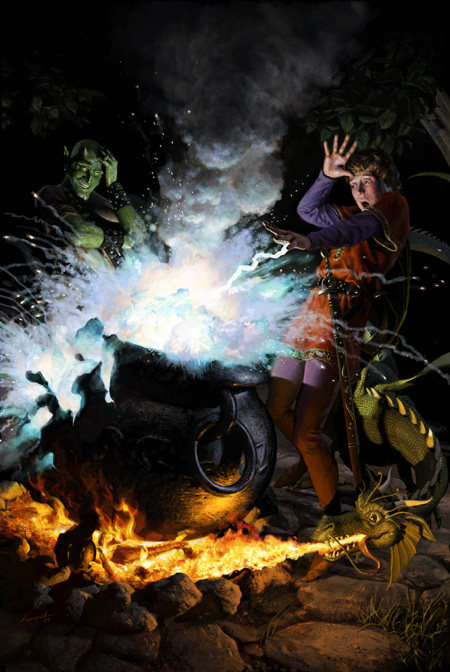
CLERICS
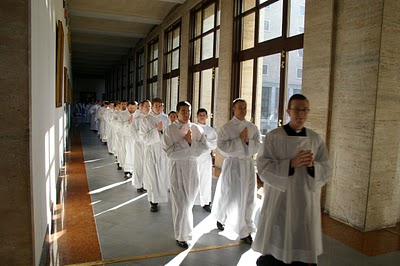
MAGIC-USERS
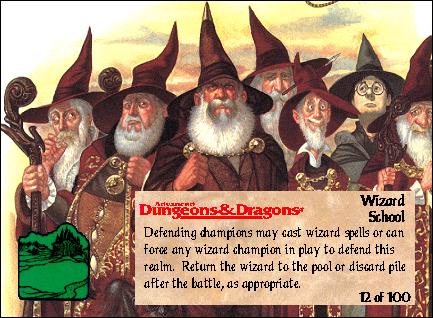


remember: there is a 0level.notes.htm file